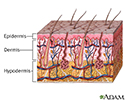Sweating
Perspiration
Sweating is the release of liquid from the body's sweat glands. This liquid contains salt. This process is also called perspiration.
Sweating helps your body stay cool. Sweat is commonly found under the arms, on the feet, and on the palms of the hands.

Considerations
The amount you sweat depends on how many sweat glands you have.
A person is born with about 2 to 4 million sweat glands, which begin to become fully active during puberty. Men's sweat glands tend to be more active.
Sweating is controlled by the autonomic nervous system. This is the part of the nervous system that is not under your control. Sweating is the body's natural way of regulating temperature.
Things that can make you sweat more include:
- Hot weather
- Exercise
- Situations that make you nervous, angry, embarrassed, or afraid
Heavy sweating may also be a symptom of menopause (also called a "hot flash").
Causes
Causes may include:
- Alcohol
- Caffeine
- Cancer
- Complex regional pain syndrome
- Emotional or stressful situations (anxiety)
- Essential hyperhidrosis
- Exercise
- Fever
- Infection
- Low blood sugar (hypoglycemia)
- Medicines, such as thyroid hormone, morphine, drugs to reduce fever, and medicines to treat mental disorders
- Menopause
- Spicy foods (known as "gustatory sweating")
- Warm temperatures
- Withdrawal from alcohol, sedatives, or narcotic painkillers
Home Care
After sweating a lot, you should:
- Drink plenty of fluids (water, or fluids containing electrolytes such as sports drinks) to replace sweat.
- Lower room temperature a little bit to prevent more sweating.
- Wash your face and body if the salt from sweat has dried on your skin.
When to Contact a Medical Professional
Contact your health care provider if sweating occurs with:
- Chest pain
- Fever
- Rapid, pounding heartbeat
- Shortness of breath
- Weight loss
These symptoms may indicate a problem, such as overactive thyroid or an infection.
Also contact your provider if:
- You sweat a lot or sweating lasts for a long time or cannot be explained
- Sweating occurs with or is followed by chest pain or pressure
- You lose weight from sweating or often sweat during sleep
References
Chelimsky T, Chelimsky G. Disorders of the autonomic nervous system. In: Jankovic J, Mazziotta JC, Pomeroy SL, Newman NJ, eds. Bradley and Daroff's Neurology in Clinical Practice. 8th ed. Philadelphia, PA: Elsevier; 2022:chap 107.
Hall JE, Hall ME. Body temperature regulation and fever. In: Hall JE, Hall ME, eds. Guyton and Hall Textbook of Medical Physiology. 14th ed. Philadelphia, PA: Elsevier; 2021:chap 74.
McGrath JA. The structure and function of skin. In: Calonje E, Brenn T, Lazar AJ, Billings SD, eds. McKee's Pathology of the Skin. 5th ed. Philadelphia, PA: Elsevier; 2020:chap 1.
Review Date: 6/20/2023






